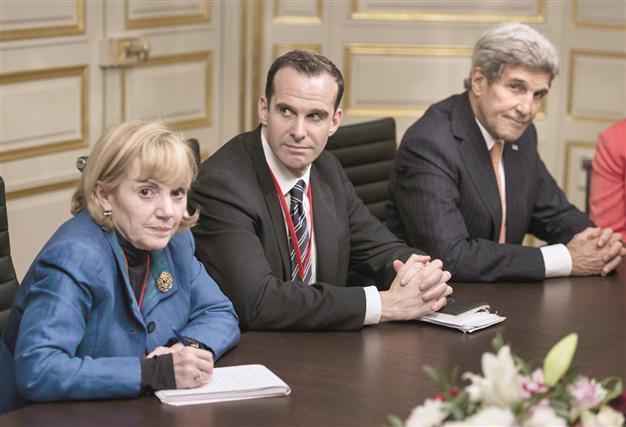Turkey to sit down at negotiation table with US after mandate vote
Sevil Erkuş ANKARA

United States Deputy Assistant Secretary Brett McGurk (C), sits with US Secretary of State John Kerry (R). AFP Photo
Turkey is set to start negotiations with U.S. officials on the issue of cooperation with coalition forces against the Islamic State of Iraq and Levant (ISIL), following Parliament’s vote for the motion authorizing the government to deploy troops to foreign countries and to allow the deployment of military forces from other countries.In a show of urgency of the issue, a security summit was scheduled to convene after the voting of the motions late Oct. 2 under the leadership of President Recep Tayyip Erdoğan and with the participation of Prime Minister Ahmet Davutoğlu and Chief of General Staff Gen. Necdet Özel along with other top military and civilian officials to mull over the next steps Turkey will take. Top Turkish officials are expected to mull over the position Turkey will adopt to respond to potential demands from the United States.
Unlike the mandate in March 1, 2003, which would have allowed the U.S. military to invade Iraq from Turkish soil but was rejected by the Turkish Parliament, this time Ankara has first sought authorization from Parliament before sitting at the negotiating table with Washington.
President Barack Obama’s special representative in dealing with the ISIL threat, former Gen. John Allen, and deputy undersecretary of the State Department, Ambassador McGurk, are expected to visit Turkey in the coming weeks as part of their regional tour.
State Department Spokesperson Jen Psaki said on Oct. 1 that the objective of the tour was to “determine roles” in the coalition. “We’ve been in this phase of recruiting countries and encouraging countries to be a part of this international coalition. Now it’s really the phase of determining what roles they’ll play and expanding beyond the military role. We already – there are already countries who are engaged and committed to doing more on counter financing or foreign fighters, but they want to build on that,” Psaki said.
Along with the flow of foreign fighters across Turkey’s border, discussions will also focus on the country’s role in “de-legitimizing ISIL,” she added.
“They can play a role in counter-ISIL, de-legitimizing ISIL. They can play a role in a number of areas. Clearly, there’ll be a discussion about countering the flow of foreign fighters, but it will also be about terrorist financing, about certainly what their military engagement will be, as well as the countering their extremist ideology,” Psaki said.
Asked if Gen. Allen and Ambassador McGurk would talk about Turkey’s wish for a no-fly zone or some sort of buffer zone inside Syria, Psaki said it was not “something we’re actively considering. But certainly, there’ll be a conversation about what their needs are and what their requests are as well,” she said.
U.S. Chief of General Staff Gen. Dempsey has ruled out the possibility of establishing safe havens in Syria, and a senior Turkish Foreign Ministry official also admitted that political counterparts in the U.S. are “not politically at that point.” “But they are considering the issue … Diplomacy is not mathematics. One comes to common ground gradually,” the official said.
On the legality of a military move into Syria under international law, the official said Ankara found “sufficient” the U.S. stance of claiming a right to strike ISIL in Syria based on the principle of individual self-defense.
Meanwhile Foreign Minister Mevlüt Çavuşoğlu has said Turkey is insisting on establishing safe havens under the U.N. roof, ruling out unilateral action being taken by Turkey if no other country joins.
“We don’t have such an alternative at the moment. We want this happen under the roof of the U.N. The humanitarian aspect is at the forefront,” Çavuşoğlu told reporters late on Oct. 1.
He also said Turkey, in principle, objected to terrorist organizations take possession of arms, stressing that arming such groups because they are fighting a common enemy would be “mistake.” “We mean it when we say the PKK should not reach those arms,” he said, adding that Turkey also objects to arming the Iraqi army before its restructuring is finalized.
















